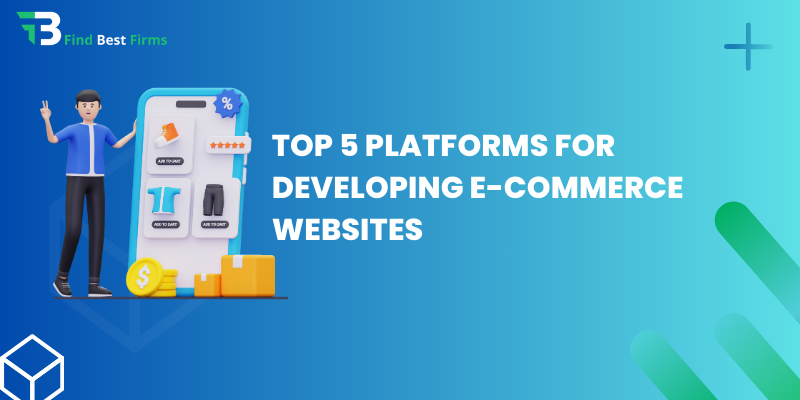The fast growth of the e-commerce industry is inspiring more individuals to launch the online businesses they’ve always dreamed of. Selecting the right platform for your e-commerce website is crucial, as it impacts everything from functionality and user experience to scalability and cost. This comprehensive guide explores the top 5 platforms for developing e-commerce websites, each offering unique features and benefits tailored to various business needs. We’ll also touch on how partnering with top eCommerce development companies can further enhance your online store’s performance and success.
What is E-Commerce?
E-commerce is the process of buying and selling products or services online through websites or apps. It enables businesses to operate digitally, providing customers with the convenience of shopping anytime, anywhere—without the need for a physical store.
Why is E-Commerce Important for Your Business?
E-commerce expands your market reach, increases sales potential, and offers cost-effective solutions. It allows businesses to operate 24/7, connecting with customers globally and providing them with a convenient shopping experience. Additionally, e-commerce platforms provide data-driven insights into customer behavior and sales trends, allowing businesses to make informed decisions and optimize their offerings. E-commerce also enables a personalized shopping experience through AI-powered recommendations, enhancing customer satisfaction and engagement.
Here are the top 5 e-commerce development platforms:
1. Shopify

Overview:
Shopify is one of the most popular e-commerce platforms globally, known for its user-friendly interface and robust features. It caters to businesses of all sizes, from small startups to large enterprises. Shopify offers a cloud-based solution, eliminating the need for manual updates or server management.
Key Features:
- User-Friendly Interface: Shopify is renowned for its ease of use. Setting up an online store is straightforward, thanks to its intuitive drag-and-drop builder.
- Extensive App Marketplace: Shopify’s App Store offers a wide range of third-party apps and integrations to enhance functionality. Whether you need inventory management, email marketing, or social media integration, there’s likely an app to meet your needs.
- Built-In Payment Processing: Shopify Payments simplifies payment processing, offering seamless integration with major credit cards and payment gateways. It also ensures secure transactions, which is crucial for building customer trust.
Pros:
- Scalability: Shopify can grow with your business, offering different plans and add-ons to accommodate increasing traffic and sales.
- Support and Resources: Shopify provides 24/7 customer support and a wealth of resources, including tutorials and forums, to help you navigate any issues.
Cons:
- Monthly Fees and Transaction Costs: Shopify operates on a subscription-based model, with varying costs depending on the plan. Additionally, there are transaction fees if you use a third-party payment gateway.
- Limited Customization: While Shopify offers numerous themes and apps, customization options can be limited compared to some other platforms.
2. WooCommerce
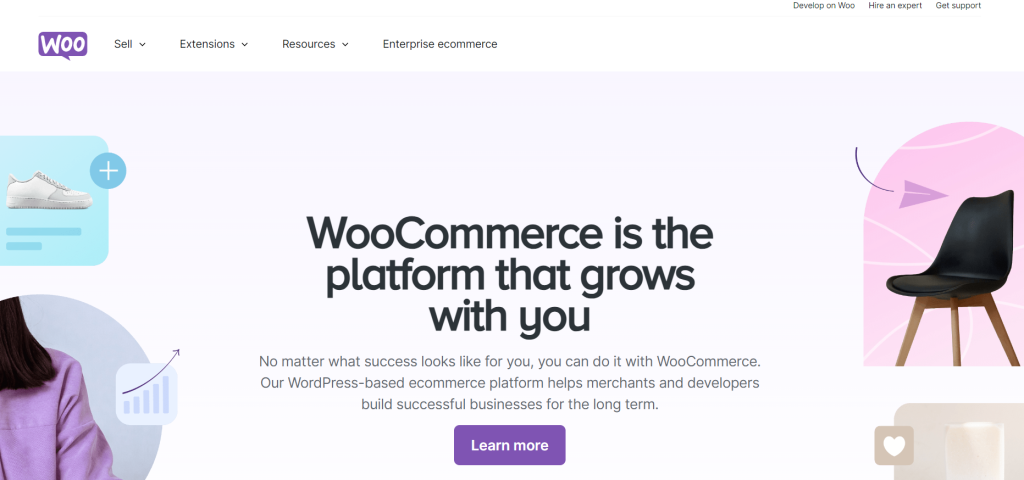
Overview:
WooCommerce is a powerful e-commerce plugin for WordPress, known for its flexibility and extensive customization options. It’s a popular choice for businesses that already use WordPress for their websites or those who want a highly customizable platform.
Key Features:
- Integration with WordPress: WooCommerce seamlessly integrates with WordPress, allowing you to use its vast array of plugins and themes to enhance your e-commerce site.
- Customizable: WooCommerce is highly customizable, offering a wide range of plugins and extensions for additional functionality, from advanced shipping options to detailed analytics.
- Cost-Effective: The core WooCommerce plugin is free, though you may incur costs for premium extensions and themes.
Pros:
- High Level of Customization: With WooCommerce, you have full control over your site’s design and functionality. You can tailor your e-commerce store to meet specific business needs.
- Large Community: The WordPress community provides extensive support, with numerous forums, tutorials, and resources available.
Cons:
- Requires Technical Knowledge: While WooCommerce is flexible, it may require some technical expertise to set up and manage effectively. This is especially true if you want to implement advanced features or customizations.
- Potential Additional Costs: While the base plugin is free, costs can add up with premium plugins, themes, and hosting services.
3. Magento
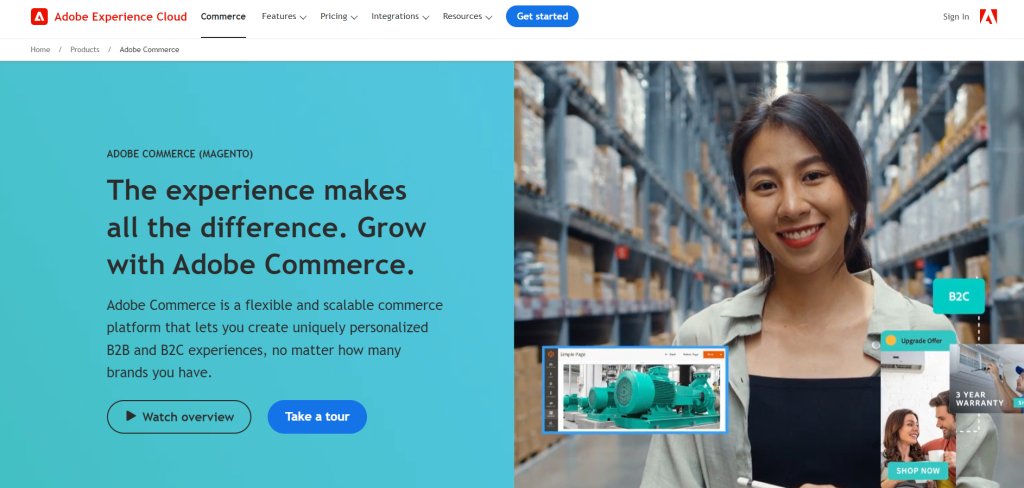
Overview:
Magento, now known as Adobe Commerce, is a robust e-commerce platform designed for large-scale operations. It offers a high level of customization and scalability, making it suitable for enterprises with complex needs.
Key Features:
- Advanced Features: Magento provides advanced features for managing large inventories, multiple stores, and complex product configurations. It supports various currencies, languages, and payment methods.
- Scalability: Magento is designed to handle high traffic and large volumes of transactions, making it ideal for growing businesses.
- Customizable: Magento offers extensive customization options, allowing developers to tailor the platform to specific business requirements.
Pros:
- Powerful and Flexible: Magento’s extensive feature set and customization options make it suitable for businesses with complex needs and large-scale operations.
- Strong International Support: Magento supports multiple languages and currencies, making it a good choice for businesses with a global customer base.
Cons:
- Higher Learning Curve: Magento’s advanced features and customization options come with a steeper learning curve. It may require specialized development skills to fully leverage its capabilities.
- Higher Costs: Magento can be more expensive compared to other platforms, with costs associated with development, hosting, and maintenance.
4. BigCommerce
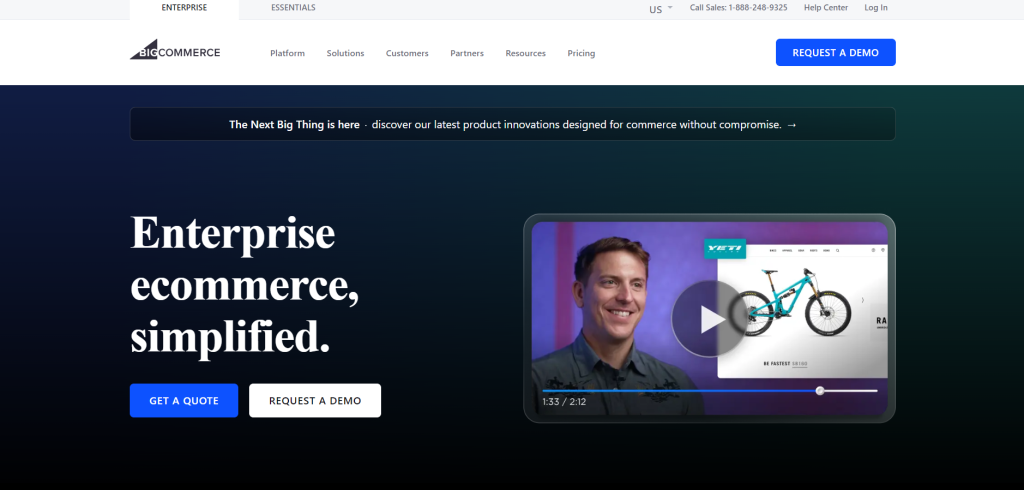
Overview:
BigCommerce is a cloud-based e-commerce platform that offers a comprehensive set of features for businesses of all sizes. It’s known for its ease of use, scalability, and built-in tools for driving sales.
Key Features:
- Built-In SEO and Marketing Tools: BigCommerce includes built-in tools for SEO, email marketing, and social media integration, helping you drive traffic and increase visibility.
- Multi-Channel Selling: BigCommerce allows you to sell on various platforms, including Amazon, eBay, and social media channels, from a single dashboard.
- No Transaction Fees: Unlike some other platforms, BigCommerce does not charge transaction fees, which can be advantageous for businesses with high sales volumes.
Pros:
- Comprehensive Tools: BigCommerce provides a wide range of built-in tools for managing and marketing your online store, reducing the need for third-party apps.
- Strong Customer Support: The platform offers robust customer support and resources to help you with any issues or questions.
Cons:
- Higher Pricing: BigCommerce’s pricing can be higher compared to other platforms, especially for plans with advanced features.
- Limited Free Themes: The number of free themes available is limited, and premium themes can be costly.
5. Wix eCommerce
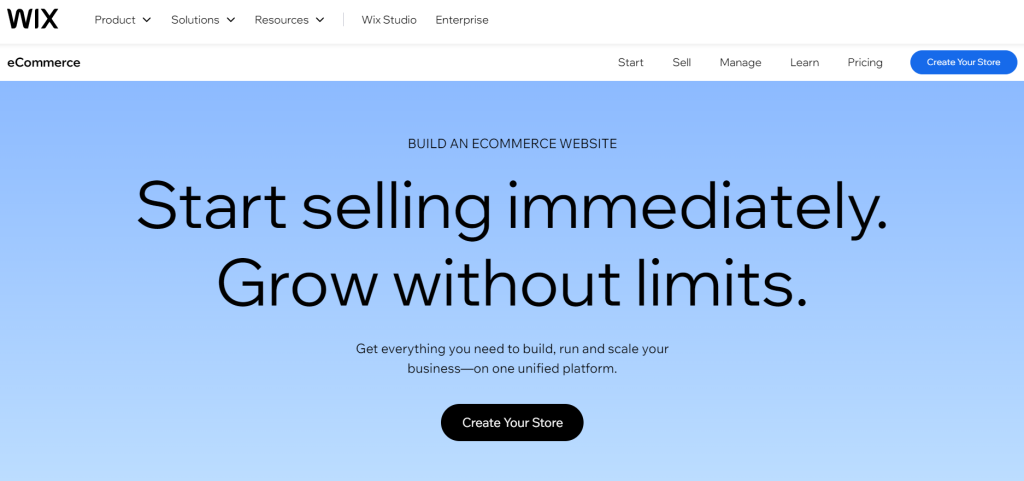
Overview:
Wix eCommerce is part of the Wix website builder platform, known for its ease of use and visually appealing design options. It’s an excellent choice for small businesses and individuals looking to set up an online store quickly.
Key Features:
- Drag-and-Drop Builder: Wix’s drag-and-drop builder makes it easy to create and customize your online store without needing technical skills.
- Affordable Pricing: Wix offers competitive pricing plans with various features, making it a cost-effective option for small businesses.
- Template Variety: Wix provides a range of modern and visually appealing templates to choose from, allowing you to create a professional-looking store.
Pros:
- User-Friendly: Wix’s intuitive interface and drag-and-drop functionality make it accessible for beginners and those with limited technical expertise.
- Quick Setup: Setting up an online store with Wix is fast and straightforward, allowing you to get your business online quickly.
Cons:
- Limited Scalability: Wix may not be suitable for large-scale operations or businesses with complex needs due to its limited scalability.
- Less Customization: While Wix offers a range of templates and features, customization options may be more limited compared to other platforms.
Conclusion
Selecting the right e-commerce platform is pivotal to your online store’s success. Each of the platforms discussed—Shopify, WooCommerce, Magento, BigCommerce, and Wix eCommerce—offers distinct features and benefits tailored to different business needs and sizes.
For businesses looking to maximize their e-commerce potential, partnering with top eCommerce development companies can provide additional expertise and support. These companies specialize in customizing and optimizing e-commerce platforms, ensuring that your online store performs at its best and meets your specific requirements.
As you consider which platform is right for you, evaluate your business needs, budget, and growth plans. Each platform has its strengths and potential drawbacks, so choosing the one that aligns with your goals will set you up for success in the competitive world of e-commerce.
Feel free to reach out to eCommerce development experts to explore how these platforms can be tailored to your unique business needs and to ensure that your online store is positioned for success.

